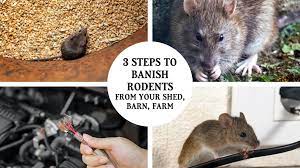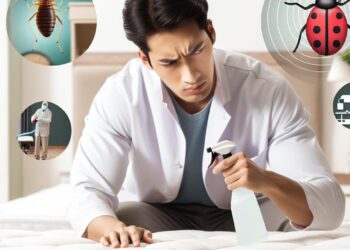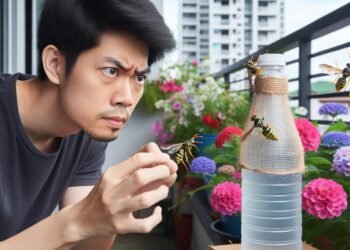Rodents are a common nuisance in many parts of the world. They can cause damage to property and carry diseases that can be harmful to humans. As such, it is important to control their populations. However, it is equally important to ensure that any measures taken to control rodent populations are safe and effective. In this article, we will explore some safe and effective ways to control rodent populations.
Seal entry points
The first step in controlling rodent populations is to prevent them from entering your home or property in the first place. Rodents can enter through even the tiniest of openings, so it is important to thoroughly inspect your property and seal any entry points you find. This may involve using caulking or expanding foam to fill gaps around pipes, vents, and other openings.
Keep your property clean
Rodents are attracted to areas that are messy and cluttered. To prevent them from taking up residence in your home or property, it is important to keep things clean and tidy. This includes removing any food or water sources that may attract rodents, such as pet food, garbage, or standing water. Regularly cleaning up debris and clutter can also help to discourage rodents from setting up shop.

Use rodent-proof containers
When storing food or other items that rodents may be attracted to, it is important to use rodent-proof containers. This may include metal or plastic containers with tight-fitting lids. It is also important to keep these containers off the ground, as rodents can easily climb up and into them if they are within reach.
Set traps
Traps are a safe and effective way to control rodent populations, especially in areas where poison baits are not suitable. There are a variety of traps available, including snap traps, live traps, and glue traps. Snap traps are the most common type of trap and are designed to kill the rodent quickly and humanely. Live traps capture the rodent alive, allowing you to release it elsewhere. Glue traps use a sticky substance to trap the rodent, but are generally considered to be less humane than other types of traps.
When setting traps, it is important to place them in areas where rodents are known to travel, such as along walls or near entry points. It is also important to check traps regularly and dispose of any trapped rodents in a safe and sanitary manner.
Use poison baits
Poison baits are another option for controlling rodent populations, but they should be used with caution. If not used properly, poison baits can be harmful to pets, wildlife, and humans. It is important to read and follow all instructions carefully when using poison baits.
When using poison baits, it is important to place them in areas where rodents are known to travel. It is also important to keep the bait away from pets and wildlife, and to use tamper-resistant bait stations to prevent accidental exposure.

Hire a professional
If you are unable to control rodent populations on your own, it may be necessary to hire a professional pest control company. Pest control professionals have the knowledge and experience necessary to safely and effectively control rodent populations. They can also provide advice on preventative measures to help keep rodents from returning in the future.
When hiring a pest control company, it is important to choose a reputable and licensed company. It is also important to ask about the methods and products they use, and to ensure that they are safe and effective.
There are many safe and effective ways to control rodent populations. By sealing entry points, keeping your property clean, using rodent-proof containers, setting traps, using poison baits with caution, and hiring a professional if necessary, you can help to prevent damage to your property and protect your family’s health.
It is important to note that while controlling rodent populations is necessary, it is also important to do so in a humane way. The use of cruel or inhumane methods, such as glue traps or poison baits that cause a slow and painful death, should be avoided whenever possible. Humane methods, such as live traps or quick-kill traps, should be used instead.
It is also important to take into consideration the impact that rodent control methods may have on other animals and the environment. Poison baits, for example, can harm not only rodents but also other animals that may consume the bait, such as pets or wildlife. Additionally, some rodenticides can accumulate in the environment and have long-term effects on ecosystems.
To minimize the impact of rodent control methods on the environment, it is important to use products and methods that are designed to be as safe and environmentally friendly as possible. For example, some pest control companies offer eco-friendly rodent control methods that use natural or non-toxic products.
In addition to taking steps to control rodent populations, it is also important to practice good hygiene and sanitation habits to help prevent rodent infestations. This includes cleaning up spilled food, keeping garbage in tightly sealed containers, and regularly cleaning and disinfecting areas where food is prepared and eaten.
Controlling rodent populations is important for both health and safety reasons, but it should be done in a safe and humane way that minimizes the impact on the environment. By sealing entry points, keeping your property clean, using rodent-proof containers, setting traps, using poison baits with caution, and hiring a professional if necessary, you can help to prevent damage to your property and protect your family’s health. Remember to also practice good hygiene and sanitation habits to help prevent rodent infestations in the first place.
Another important consideration when controlling rodent populations is the potential for disease transmission. Rodents are known carriers of many diseases that can be harmful to humans, including hantavirus, leptospirosis, and salmonella. To minimize the risk of disease transmission, it is important to wear gloves and other protective gear when handling dead rodents or cleaning up areas that have been contaminated with rodent droppings or urine.
control rodent populations
It is also important to properly dispose of dead rodents and any materials that have been contaminated with rodent waste. This should be done in a way that prevents the spread of disease, such as by sealing the materials in a plastic bag and disposing of them in a tightly sealed trash container.
In addition to the methods mentioned above, there are also some natural and non-toxic methods for controlling rodent populations that may be effective in certain situations. These methods include using essential oils, such as peppermint oil or eucalyptus oil, which can be placed around entry points to deter rodents. Another option is to use ultrasonic devices, which emit high-frequency sound waves that are said to be unpleasant to rodents.
However, it is important to note that the effectiveness of these natural and non-toxic methods has not been scientifically proven, and they may not be effective in all situations. In addition, some of these methods may have a limited lifespan and may need to be replaced periodically.
In conclusion
Controlling rodent populations is an important step in protecting your property and your health. By using safe and effective methods, such as sealing entry points, keeping your property clean, using rodent-proof containers, setting traps, using poison baits with caution, and hiring a professional if necessary, you can help to prevent damage to your property and protect your family’s health. Remember to also practice good hygiene and sanitation habits to help prevent rodent infestations in the first place. By taking these steps, you can help to ensure that your home or property remains safe and free from rodents.

















